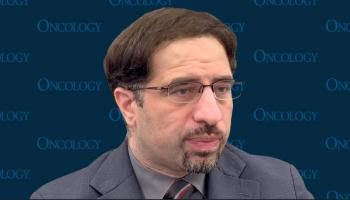
The National ICE-T Conference may inspire future collaboration between community and academic oncologists in the management of different cancers.

Your AI-Trained Oncology Knowledge Connection!


The National ICE-T Conference may inspire future collaboration between community and academic oncologists in the management of different cancers.

Long-term toxicities like infections and secondary primary malignancies remain a concern when sequencing novel agents for those with multiple myeloma.

Management of adverse effects and access to cellular therapies among community oncologists represented key points of discussion in multiple myeloma.
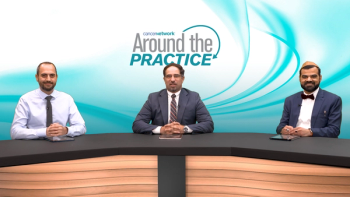
Panelists discuss how CAR T therapy has transformed the treatment landscape for relapsed/refractory multiple myeloma, highlighting critical factors for success including patient selection, timing of referral, management of adverse effects, and the importance of coordinated care between academic centers and community practices.

Panelists discuss how they would approach a challenging case of a 68-year-old man with high-risk relapsed/refractory multiple myeloma who has progressed after stem cell transplantation, considering factors such as prior treatments, cytogenetic profile, and current fitness status to determine optimal next-line therapy options.

Panelists discuss how expanding CAR T therapy into earlier lines of multiple myeloma treatment requires careful evaluation of clinical trial data, infrastructure readiness, patient selection criteria, and manufacturing capacity while balancing the therapy’s potential benefits against established treatment approaches.

Panelists discuss how successful comanagement of CAR T-cell therapy cases requires close coordination between academic centers and community practices, with structured protocols for monitoring, communication, and patient handoffs, while addressing challenges in referral timing, resource allocation, and long-term follow-up care.

Panelists discuss how bridging therapy during the CAR T manufacturing waiting period requires careful patient-specific decisions about whether to use chemotherapy, targeted agents, or observation alone, based on disease aggressiveness, patient condition, and expected manufacturing timeframes.

Panelists discuss how CAR T-cell therapy, a groundbreaking immunotherapy treatment, works by extracting a patient’s T cells, genetically modifying them to target cancer cells, and reinfusing them back into the patient’s body through a process that involves close monitoring and specialized care

Panelists discuss how the chimeric antigen receptor T-cell referral pathway progresses from initial community physician contact through patient evaluation and final selection, highlighting the key steps and considerations in the institutional workflow process.

Panelists discuss how patient selection criteria for second-line chimeric antigen receptor T-cell therapy in relapsed/refractory multiple myeloma encompass both clinical eligibility guidelines and practical considerations, including geographical and financial factors.

Panelists discuss how institutional challenges around chimeric antigen receptor T-cell therapy slot availability and waiting list management influence treatment sequencing decisions and affect subsequent therapy choices in earlier treatment lines for multiple myeloma.

Panelists discuss how emerging data on chimeric antigen receptor T-cell therapies ciltacabtagene autoleucel and idecabtagene vicleucel for earlier treatment lines in relapsed/refractory multiple myeloma influence institutional decision-making factors for their implementation.
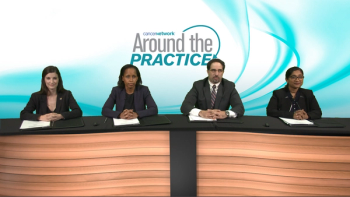
The expert panel overviews factors to consider with bispecific antibodies and offers closing insights on unmet needs in the multiple myeloma treatment space.

Nausheen Ahmed, MD, gives an overview of BCMA bispecific T-cell engagers used in the treatment of multiple myeloma.

Experts on multiple myeloma discuss the mechanism of action and adverse events for teclistamab and compare CAR T-cell therapy with bispecific T-cell engagers (BiTEs).

The expert panel discusses CAR T-cell therapy options and treatment considerations for patients with multiple myeloma.

Al-Ola Abdallah, MD, presents the case of a patient with multiple myeloma treated with CAR T-cell therapy and teclistamab.

Nausheen Ahmed, MD, and Al-Ola Abdallah, MD, discuss the use of CAR T-cell therapy in patients with transplant-ineligible multiple myeloma.

The expert panel gives an overview of factors that influence treatment decisions in patients with transplant-ineligible multiple myeloma.

Leyla O. Shune, MD, reviews the MAIA trial, which looked at DRd vs Rd in patients with transplant-ineligible multiple myeloma.

The expert panel presents the case of a patient with multiple myeloma and discusses evaluating transplant eligibility in patients with MM.

The standard of care for high-risk multiple myeloma remains unsettled, according to an expert panel from Kansas City.

Experts on multiple myeloma offer clinical insights on treatment options and considerations for patients with standard- and high-risk multiple myeloma.

Nausheen Ahmed, MD, discusses the measurement of treatment response following induction therapy in patients with multiple myeloma.

The expert panel provides clinical insights on the key features of high-risk multiple myeloma and a look toward the clinical trial landscape.

Clinical experts examine the role of transplant in multiple myeloma and discuss key clinical trials and the impact of adding daratumumab to triplet therapy.

Experts on multiple myeloma discuss recent updates from the GRIFFIN trial on patients with transplant-eligible multiple myeloma.

A panel of clinical experts presents the case of a patient with high-risk multiple myeloma (MM) who underwent transplant.
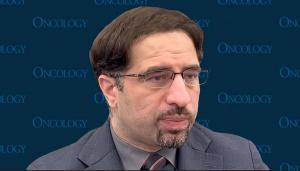
Published: August 1st 2025 | Updated:

Published: July 30th 2025 | Updated:
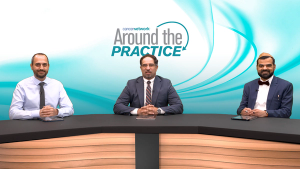
Published: December 20th 2024 | Updated:

Published: January 3rd 2025 | Updated: